How I hacked Hacker News: 1.3 million stories tell a tale
Hacker News is a news aggregator where visitors vote on stories. When your story gets a lot of votes it is a big deal: it can increase your audience by orders of magnitude. I analyzed 1.3 million Hacker News stories and found that when a story is submitted makes a big difference.
Last week, I was lamenting the fact that the fantastic story I posted to Hacker News went completely unnoticed. I began to wonder if there was more to it than a quality post and a catchy title. Does it matter when you post the story, for instance?
It seems like a reasonable question. New stories are listed on the newest page and have a limited time to get “discovered” before they are pushed down the list by newer stories. If you submit when others aren’t, your story will be visible longer. However, that might also mean that there are fewer readers around while your article is prominently displayed, and there may be other, unknown, factors at play… I hoped to find a sweet spot; a best time of the week to submit my next story.
So, I busted out Python, downloaded 1.3 million Hacker News stories from 2012-2015, then started analyzing using R and ggplot2.
What day of the week should you submit?
Far more stories are submitted during weekdays than on the weekends.
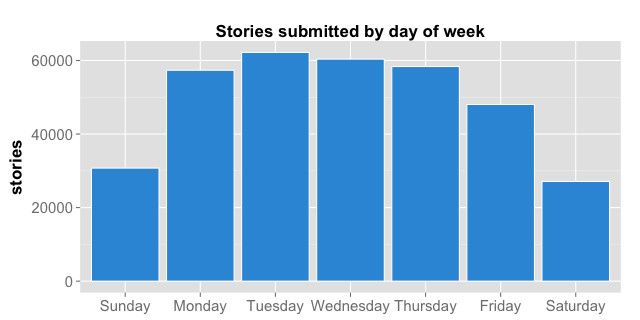
So is it better to submit on the weekend? I defined a story as “discovered” if it received more than 10 votes (that’s enough to get on front page, after that it’s up to the readers), and looked at the fraction of stories discovered (the discovery rate) by the day of the week they were submitted.
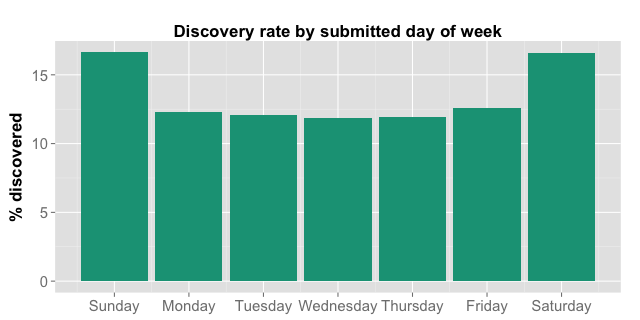
Yes! Submitting your story on the weekend makes a significant difference. 16.6% (±0.2) of stories submitted on Sunday get discovered, compared to 11.9% (±0.1) on Thursday: a 39% boost.
Stories submitted on Sunday are up to 39% more likely to be discovered.
What time of day should you submit?
The bulk of stories are submitted as the Californian work-day begins.
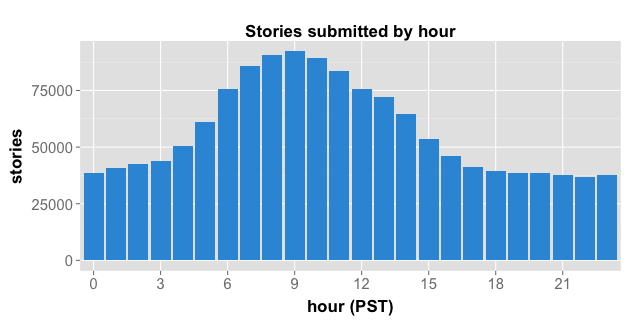
So is it better to submit your story in the middle of the night? I looked at the discovery rate by the hour of the day a story was submitted.
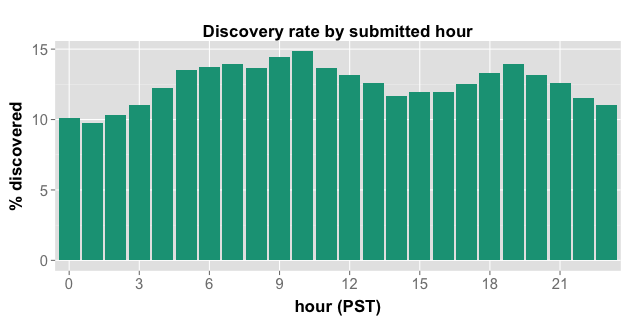
No! This is an interesting trend. There are two clear peaks at around 10am (during a San Franciscan’s coffee break?), and at 7pm (when she gets home from work?). 14.9% (±0.2) of stories submitted at 10am get discovered, compared to 9.8% (±0.2) at 2am: a 52% boost.
Stories submitted at 10a (PST) are up to 52% more likely to be discovered.
What exact hour of the week should you submit?
We can drill down further, and look at the exact hour during a given week when you should submit your story. The number of stories submitted over the week follows a predictable trend:
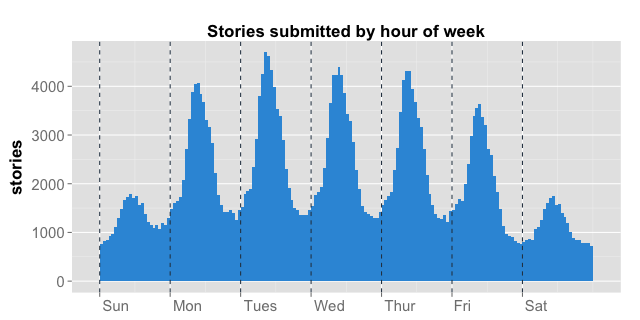
So, what is the best time of week to submit your story?
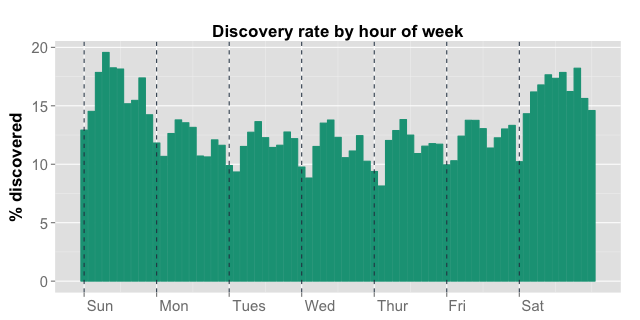
It turns out that Sunday at 7am (PST) is the best time to submit your story, with a 20.7% (±1.1) chance of getting discovered, compared to Thursday at 3am, with 7.6% (±0.6): a 172% boost!
Stories submitted Sunday at 7am (PST) are up to 172% more likely to be discovered.
Conclusion
When you submit your story to Hacker News matters, a lot. Of course, nothing replaces great content and a snappy title, but you can give your story a much better chance by submitting on Sunday morning, instead of on a weekday. This article was submitted to Hacker News at 7a (PST) on Sunday, August 16th. I’m curious to see how it does!
Caveats
There are a few caveats you should consider before blindly following this article’s advice:
I’ve commited a grave statistical faux-pas in this article. Did you spot it? I showed that the number of votes a Hacker News story gets is correlated with the time it is submitted. Then, I told you that submitting your story at a particular time will cause it to have a higher chance of success. Correlation does not imply causation, however, so this is unproven. It is entirely possible that stories submitted on the weekend have simply been better than those submitted on weekdays, or that weekend readers are “vote-happy”. However, my intuition suggests to me that it is most likely that there is true causation here.
I found that the effect of the time-of-day has been changing slowly over time. In 2012 and 2013 it was more pronounced. I have only used the most recent 12-months of stories to generate these plots, in order to show the current effect.
This may be a self-defeating prophecy. If lots of people follow my advice and submit their stories on Sunday mornings, then these results may soon be entirely reversed. I’m very interested to see if that occurs.